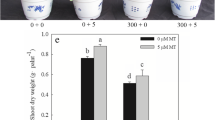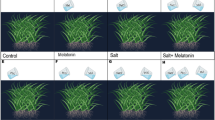Abstract
Key message
The study on melatonin biosynthesis mutant snat1snat2 revealed that endogenous melatonin plays an important role in salt responsiveness by mediating auxin signaling.
Abstract
Melatonin is a pleiotropic signaling molecule, which, besides being involved in multiple growth and developmental processes, also mediates environmental stress responses. However, whether and how endogenous melatonin is involved in salt response has not been determined. In this study, we elucidated the involvement of endogenous melatonin in salt response by investigatiing the impact of salt stress on a double mutant of Arabidopsis (snat1snat2) defective in melatonin biosynthesis genes SNAT1 and SNAT2. This mutant was found to exhibit salt sensitivity, manifested by unhealthy growth, ion imbalance and ROS accumulation under salt stress. Transcriptomic profiles of snat1snat2 revealed that the expression of a large number of salt-responsive genes was affected by SNAT defect, and these genes were closely related to the synthesis of auxin and several signaling pathways. In addition, the salt-sensitive growth phenotype of snat1snat2 was alleviated by the application of exogenous auxin. Our results show that endogenous melatonin may be essential for plant salt tolerance, a function that could be correlated with diverse activity in mediating auxin signaling.





Similar content being viewed by others
Data availability
The data that support the findings of this study are available within the supplementary materials or from the corresponding author upon reasonable request.
References
Ahanger MA, Tomar NS, Tittal M, Argal S, Agarwal RM (2017) Plant growth under water/salt stress: ROS production; antioxidants and significance of added potassium under such conditions. Physiol Mol Biol Plants 23(1):731–744
Arnao MB, Hernández-Ruiz J (2014) Melatonin: plant growth regulator and/or biostimulator during stress? Trends Plant Sci 19(12):789–797
Bai Y, Guo J, Reiter RJ, Wei Y, Shi H (2020) Melatonin synthesis enzymes interact with ascorbate peroxidase to protect against oxidative stress in cassava. J Exp Bot 71(18):5645–5655
Baxter A, Mittler R, Suzuki N (2014) ROS as key players in plant stress signalling. J Exp Bot 65(5):1229–1240
Chen Z, Xie Y, Gu Q, Zhao G, Zhang Y, Cui W, Xu S, Wang R, Shen W (2017) The AtrbohF-dependent regulation of ROS signaling is required for melatonin-induced salinity tolerance in Arabidopsis. Free Radic Biol Med 108:465–477
Chen L, Liu L, Lu B, Ma T, Li C (2020) Exogenous melatonin promotes seed germination and osmotic regulation under salt stress in cotton (Gossypium hirsutum L.). PLoS ONE 15(1):e0228241
Fan J, Xie Y, Zhang Z, Chen L (2018) Melatonin: a multifunctional factor in plants. Int J Mol Sci 19(5):1528
Gong Z, Xiong L, Shi H, Yang S, Herrera-Estrella RL, Xu G, Chao D-Y, Li J, Wang P-Y, Qin F, Li J, Ding Y, Shi Y, Wang Y, Yang Y, Guo Y, Zhu J-K (2020) Plant abiotic stress response and nutrient use efficiency. Sci China Life Sci 63(5):635–1674
Ibrahim MH, Jaafar HZ (2012) Primary, secondary metabolites, H2O2, malondialdehyde and photosynthetic responses of Orthosiphon stamineus Benth. to different irradiance levels. Molecules 17:1159–1176
Kang K, Lee K, Park S, Kim YS, Back K (2010) Enhance dproductionof melatonin by ectopic overexpression of human serotonin N-acetyltransferase plays a role in cold resistance intransgenic rice seedlings. J Pineal Res 49:176–182
Ke Q, Ye J, Wang B, Ren J, Yin L, Deng X, Wang S (2018) Melatonin mitigates salt stress in wheat seedlings by modulating polyamine metabolism. Front Plant Sci 9:914
Korver RA, Koevoets IT, Testerink C (2018) Out of shape during stress: a key role for auxin. Trends Plant Sci 23(9):783–793
Lee K, Back K (2017) Overexpression of rice serotonin N-acetyltransferase 1 in transgenic rice plants confers resistance to cadmium and senescence and increases grain yield. J Pineal Res 62:e12392
Lee HY, Byeon Y, Lee K, Hye-Jung L, Back K (2016) Cloning of Arabidopsis serotonin N-acetyltransferase and its role with caffeic acid O-methyltransferase in the biosynthesis of melatonin in vitro despite their different subcellular localizations. J Pineal Res 57(4):418–426
Lerner AB, Case JD, Takahashi Y, Lee Y, Mori W (1958) Isolation of melatonin, the pineal gland factor that lightens melanocytes. J Am Chem Soc 80(2):2587
Li J, Yang Y, Sun K, Chen Y, Chen X, Li X (2019) Exogenous melatonin enhances cold, salt and drought stress tolerance by improving antioxidant defense in tea plant (Camellia sinensis (L.) O. Kuntze). Molecules 24(9):182
Liang C, Zheng G, Li W, Wang Y, Hu B, Wang H, Wu H, Qian Y, Zhu XG, Tan DX (2015) Melatonin delays leaf senescence and enhances salt stress tolerance in rice. J Pineal Res 59(1):91–101
Miao RQ, Zang W, Yuan Y, Zhang Y, Zhang AQ, Pang QY (2021) The halophyte gene ScVTC2 confers resistance to oxidative stress via AsA-mediated photosynthetic enhancement. Plant Physiol Biochem 169:138–148
Muhammad I, Yang L, Ahmad S, Mosaad ISM, Al-Ghamdi AA, Abbasi AM, Zhou XB (2022) Melatonin application alleviates stress-induced photosynthetic inhibition and oxidative damage by regulating antioxidant defense system of maize: a meta-analysis. Antioxidants (basel, Switzerland) 11(3):1059–1072
Mukesh KK, Yu J, Zhou J (2018) Phytomelatonin: recent advances and future prospects. J Pineal Res 65(4):e12526
Murch SJ, Krishnaraj S, Saxena PK (2000) Tryptophan is a precursor for melatonin and serotonin biosynthesis in in vitro regenerated St. John’s wort (Hypericum perforatum L. cv. Anthos) plants. Plant Cell Rep 19(7):698–704
Parihar P, Singh S, Singh R, Singh VP, Prasad SM (2015) Effect of salinity stress on plants and its tolerance strategies: a review. Environ Sci Pollut Res Int 22(6):4056–4076
Park HJ, Kim W-Y, Yun D-J (2016) A new insight of salt stress signaling in plant. Mol Cells 39(6):447–459
Qi C, Zhang H, Liu Y, Wang X, Dong D, Yuan X, Li X, Zhang X, Li X, Zhang N, Guo Y-D (2020) CsSNAT positively regulates salt tolerance and growth of cucumber by promoting melatonin biosynthesis. Environ Exp Bot 175:104036
Ribba T, Garrido-Vargas F, O’Brien JA (2020) Auxin-mediated responses under salt stress: from developmental regulation to biotechnological applications. J Exp Bot 71(13):3843–3853
Song Z, Yang Q, Dong B, Li N, Wang M, Du T, Liu N, Niu L, Jin H, Meng D (2022) Melatonin enhances stress tolerance in pigeon pea by promoting flavonoid enrichment, particularly luteolin in response to salt stress. J Exp Bot 73(17):5992–6008
Su J, Yang X, Shao Y, Chen Z, Shen W (2020) Molecular hydrogen–induced salinity tolerance requires melatonin signalling in Arabidopsis thaliana. Plant Cell Environ 44(2):476–490
Tan D, Hardeland R, Back K, Manchester LC, Alatorre-Jimenez M, Reiter RJ (2016) On the significance of an alternate pathway of melatonin synthesis via 5-methoxytryptamine: comparisons across species. J Pineal Res 61(1):27–40
Wang P, Sun X, Li C, Wei Z, Liang D, Ma F, Expand A (2012) Long-term exogenous application of melatonin delays drought-induced leaf senescence in apple. J Pineal Res 54(3):292–302
Wang X, Zhang H, Xie Q, Liu Y, Lv H, Bai R, Ma R, Li X, Zhang X, Guo Y-D, Zhang N (2020) SlSNAT interacts with HSP40, a molecular chaperone, to regulate melatonin biosynthesis and promote thermotolerance in tomato. Plant Cell Physiol 61(5):909–921
Wei W, Tao JJ, Yin CC, Chen SY, Zhang JS, Zhang WK (2022) Melatonin regulates gene expressions through activating auxin synthesis and signaling pathways. Front Plant Sci 13:1057993
Wu D, Wen Z, Cuicui W, Qingwei M, Gang L (2017) Genetic engineering of the biosynthesis of glycinebetaine leads to alleviate salt-induced potassium efflux and enhances salt tolerance in tomato plants. Plant Sci 275:74–83
Wu Y, Fan X, Zhang Y, Jiang J, Sun L, UrRahman F, Liu C (2021) VvSNAT1 overexpression enhances melatonin production and salt tolerance in transgenic Arabidopsis. Plant Physiol Biochem 166:485–494
Yan F, Zhang J, Li W, Ding Y, Li G (2021) Exogenous melatonin alleviates salt stress by improving leaf photosynthesis in rice seedlings. Plant Physiol Biochem 163:367–375
Yicheng Y, Aimin W, Xiang L, Meng K, Wenjun W, Xianyang C, Tao X, Mingku Z, Daifu M, Zongyun L (2018) Melatonin-stimulated triacylglycerol breakdown and energy turnover under salinity stress oontributes to the maintenance of plasma membrane H+–ATPase activity and K+/Na+ homeostasis in sweet potato. Front Plant Sci 9:256
Yu Y, Bian L, Jiao Z, Yu K, Wan Y, Zhang G, Guo D (2019) Molecular cloning and characterization of a grapevine (Vitis vinifera L.) serotonin N-acetyltransferase (VvSNAT2) gene involved in plant defense. BMC Genomics 20(1):880
Zhang Y, Gao W, Lv Y, Bai Q, Wang Y (2018) Exogenous melatonin confers salt stress tolerance to Chlamydomonas reinhardtii (Volvocales, Chlorophyceae) by improving redox homeostasis. Phycologia 57(6):680–691
Zhu JK (2016) Abiotic stress signaling and responses in plants. Cell 167(2):313–324
Zia SF, Berkowitz O, Bedon F, Whelan J, Franks AE, Plummer KM (2019) Direct comparison of Arabidopsis gene expression reveals different responses to melatonin versus auxin. BMC Plant Biol 19(1):567
Acknowledgements
This work was supported by the National Natural Science Foundation of China (No. 32100298 and No. 32070350), The Excellent Youth Project of Natural Science Foundation of Heilongjiang Province (YQ2021C001) and The Fundamental Research Funds for the Central Universities (No. 2572022AW63). We would like to thank Dr Alan K Chang (Wenzhou University) for his helpful discussion and kind effort in revising the language of the manuscript.
Funding
This study was funded by the National Natural Science Foundation of China (No. 32100298 and No. 32070350), The Excellent Youth Project of Natural Science Foundation of Heilongjiang Province (YQ2021C001) and The Fundamental Research Funds for the Central Universities (No. 2572022AW63).
Author information
Authors and Affiliations
Contributions
AQZ and QYP designed the experiments and supervised the research. RQM, ZQL, YY and XFY performed the experiments and analyzed the data. RQM and AQZ wrote the manuscript with contributions from other authors.
Corresponding authors
Ethics declarations
Conflict of interest
The authors declare no conflict of interest.
Additional information
Communicated by Xian Sheng Zhang.
Publisher's Note
Springer Nature remains neutral with regard to jurisdictional claims in published maps and institutional affiliations.
Supplementary Information
Below is the link to the electronic supplementary material.
Rights and permissions
Springer Nature or its licensor (e.g. a society or other partner) holds exclusive rights to this article under a publishing agreement with the author(s) or other rightsholder(s); author self-archiving of the accepted manuscript version of this article is solely governed by the terms of such publishing agreement and applicable law.
About this article
Cite this article
Miao, R., Li, Z., Yuan, Y. et al. Endogenous melatonin involved in plant salt response by impacting auxin signaling. Plant Cell Rep 43, 33 (2024). https://doi.org/10.1007/s00299-023-03097-4
Received:
Accepted:
Published:
DOI: https://doi.org/10.1007/s00299-023-03097-4




